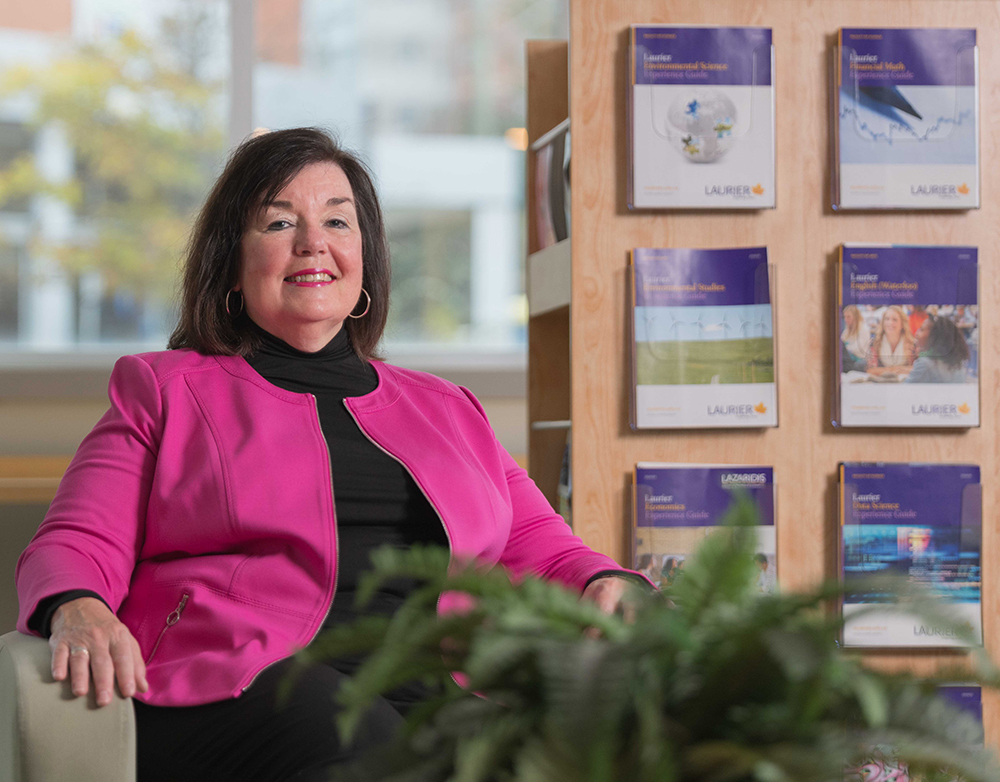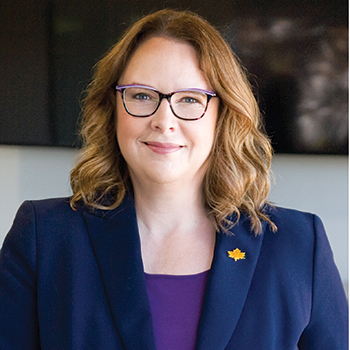Photography by John Ternan
A combination of planning and “right place, right time” led Jan Basso to her first role within what was then known as Career Services 50 years ago. A half-century later, Basso is celebrating her “golden” anniversary working at Wilfrid Laurier University as a nationally recognized pioneer in her field and the leader of the university’s acclaimed Experiential Learning and Career Development Centre.
And she has no plans to slow down any time soon.
“Jan has not only empowered Laurier's thriving community, she has helped to create it, nurture it and promote it extensively both within and beyond Laurier's borders,” says former vice-president: student affairs David McMurray, who supervised and worked alongside Basso from 1997 to 2020.

Nationally recognized leader: Jan Basso, Laurier’s assistant vice-president: Experiential Learning and Career Development, is celebrating her “golden” anniversary working at Laurier.
“Her work over the last 50 years has produced many firsts and a well-earned national reputation as best in the field.”
As Laurier’s assistant vice-president: Experiential Learning and Career Development, Basso guides a multi-campus team of more than 50 professional staff, as well as 35 student staff, and influences the career development sector in ways that have significant, life-changing impacts on tens of thousands of students aspiring to enter the workforce in their chosen fields.
Jan Basso, assistant vice-president: Experiential Learning and Career Development
The many “firsts” Basso is responsible for include the first-of-its-kind Laurier Experience Record, an online tool that allows students to maintain a comprehensive, validated record of their curricular and co-curricular activities and the skills and competencies they’ve gained. That’s in addition to earning Laurier a national first-place score in a study of career services conducted on behalf of the Canadian Education and Research Institute for Counselling.
Under Basso’s leadership, the former Career Services evolved into a comprehensive hub focused on career development, community and workplace partnerships and co-operative education.
In 2007, she spearheaded the construction of the 26,000-square-foot Centre for Co-operative Education and Career Development on the Waterloo campus.
“I am proud that Laurier is now known for the integration of career development in curricular and co-curricular spaces,” says Basso. “I love what I do and I can’t imagine doing anything else.”
Basso’s first role at Laurier was not as a staff member, but as a student. She completed her Bachelor of Arts in 1971, when Laurier was known as Waterloo Lutheran University. Basso recalls the reputation of the university at the time as one of a small institution known for its community spirit, strong athletics and commitment to understanding and meeting the changing needs of students.
After graduating, Basso wasn’t exactly sure what her professional future would hold and was initially hired as the medical secretary in Health Services at Laurier.
Enter “planned happenstance” – a career theory that pairs preparedness with unexpected possibilities. The theory suggests that people can achieve positive outcomes in life, even if they do not know exactly what they want or how they will achieve it, so long as they remain open to engaging in new opportunities.
As happenstance would have it, Basso was approached by the director of student services to assist in the preparation of a time-sensitive grant application. The application included a request for a staff position as part of a new career service on campus – the very same position that kick-started Basso’s own career in the career services field. Shortly thereafter, Basso also pursued a Master’s of Education in the field of higher education at the University of Toronto on a part-time basis to better equip herself for the role.
“You can call my career path happenstance or ‘right place, right time,’” says Basso. “I am a living example of this career theory. I am a strong believer that students should always be keeping their eyes open for opportunities to pursue.”

Attendees of a 1986 Wilfrid Laurier University Student Affairs professional retreat weekend. In the first row, left to right, are Dale Fogle, Janet Heimpel, Pauline Delion, Wendy Hatch, Chris Fazackerley and Rich Newbrough. In the second row, Peter Tron, Jan Basso and Valerie Clark. In the third row, Jim Wilgar, Fred Nichols, John Karr, Earl Rayner, Mike Belanger and George Granger.
During Basso’s tenure at Laurier, she has made it easier than ever for university students to find opportunities to become involved and recognize their potential. This is partly a result of her success in developing partnerships across Laurier’s campus locations to embed career development programming in both curricular and co-curricular activities. She introduced the career-integrated learning program, which sees Career Centre employees guide students in exploring skills and competencies that are valuable to employers and discuss how students are developing these skills through their in-class coursework.
“Jan’s leadership has provided countless students and alumni the opportunity to demonstrate how their community and work-integrated learning activities have prepared them for their careers and citizenship,” says Laurier President and Vice-Chancellor Deborah MacLatchy.
Whether students happen upon an opportunity promoted by Experiential Learning and Career Development or pursue career planning assistance, the career paths of tens of thousands of Laurier students and alumni have been shaped in part by Basso’s ground-breaking accomplishments in her field.
More than 90% of students engage with the Career Centre during their time at Laurier and lifetime access to career services is provided to alumni. This is part of the driving vision Basso and her team set for the Career Centre: for all students to engage in their career development as an integral part of their Laurier experience. For Basso and Career Centre staff, this means they focus on meeting the unique needs of each student.

President and Vice-Chancellor Deborah MacLatchy
“Jan is always listening and learning in order to understand what is changing in the aspirations of students and alumni, the goals of instructors and the needs of employers in order to evolve opportunities for all three groups to be successful,” says MacLatchy. “It is inspiring to see how her commitment to Laurier’s broader community has turned into sector leadership.”
During the late 1970s, Basso led Laurier to become the first university to use a computer system to manage job postings and employer relationships. Almost half a century later, Basso’s team continues to innovate through the use of technology-enabled student services, including initiatives such as the Laurier Experience Record.
During the early 1980s, a graduate student survey was introduced to track and report on the employment rate, career choices and further education pursuits of Laurier alumni. This graduate outcome survey was the first of its kind in Canada.
“We were part of the early days of not just on-campus career services, but of career development emerging as a profession in Canada,” says Basso.
Basso’s focus on innovative professional service models, technology-enabled service delivery and scholarship in the sector started early and has evolved to meet the needs of modern students and employers. It has also positioned her as a role model in the sector.
A peer-to-peer service model Basso co-piloted in 1981 was a move that got Laurier noticed as a trailblazer in the space. Laurier’s career information library also drew widespread attention from both educational institutions and employers. Each wanted to learn how to better embed career development into their organizations to support students and employees.
“It has always been about sharing what we were doing to help colleagues across the country,” says Basso. “For me, that spirit of sharing so that people don’t need to reinvent wheels has been so integral to my dedication to this profession. If we can develop ways of doing things that others can model, let’s do it.”
During the past 50 years, Basso has shared what she has learned with others by authoring two books, penning blog posts, presenting at conferences, and chairing national committees and boards alongside other higher education, community and employer partners.
“Thriving communities flourish in a culture of active and meaningful engagement that is co-created and integrated throughout the work and learning environment,” says McMurray. “Jan is an inspirational to all.”
Reflecting on what she would tell a recently graduated career seeker who is planning life after Laurier, Basso extends a golden piece of wisdom.
“Show initiative, respect others, challenge yourself and commit to your professional development,” says Basso. “And seek out opportunities, because they are everywhere.”